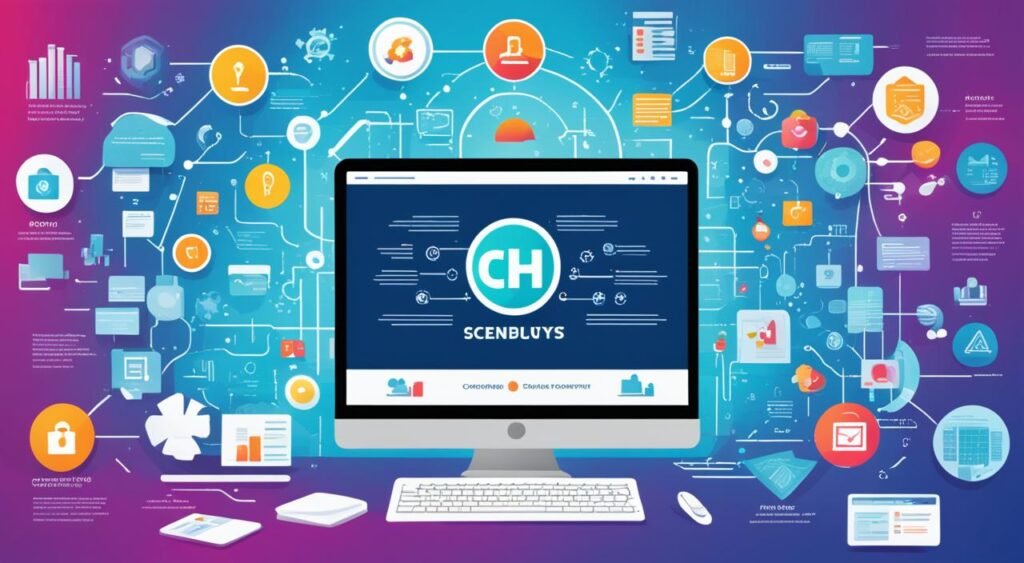Information Technology (IT) is crucial in personal, commercial, and not-for-profit settings today. It’s the use of computers and other machines to gather, store, and pass on information. When data turns into something understandable and helpful, it becomes information.
IT is everywhere, making it easy to overlook its significance. From AI and cloud services to keeping homes and businesses safe, IT’s impact can’t be ignored. To lead in IT, one must embrace new technologies and apply them wisely.
Key Takeaways
- Information Technology (IT) is the application of computers and electronic equipment to receive, store, retrieve, transmit, and manipulate data.
- IT plays a crucial role in personal, commercial, and not-for-profit uses, with a wide range of applications worldwide.
- Emerging technologies like artificial intelligence, cloud computing, and the Internet of Things are transforming the IT industry.
- Staying up-to-date with IT innovations is essential for personal and professional success in today’s digital landscape.
- IT skills are in high demand, offering diverse career opportunities in various industries.
Introduction to Information Technology
Information technology (IT) uses computers and networks to work with information. It helps businesses share data, work together, and make better choices. Learning about IT is key to understanding its many roles.
Definition and Overview of Information Technology
IT applies technology to solve business issues and work better. This includes tech pieces like hardware, software, and networking. IT allows sharing information between devices, pushing companies to have strong IT setups.
At its heart, IT is focused on data. IT experts create, store, and share data in new ways. They help businesses connect better, work together, and use data to make smart choices.
| Key Components of Information Technology | Description |
|---|---|
| Hardware | Physical computing devices, such as computers, servers, and mobile devices, that are used to store, process, and transmit data. |
| Software | Computer programs and applications that enable users to perform specific tasks and interact with data. |
| Networking | The interconnection of computing devices, allowing for the exchange of data and communication between them. |
| Data Management | The processes and technologies involved in storing, organizing, and accessing data to support business operations and decision-making. |
IT is always changing, shaping how businesses work. As tech moves forward, IT’s role in boosting innovation and making companies more productive is vital. This is especially true in today’s digital age.
“Information technology and business are becoming inextricably interwoven. I don’t think anybody can talk meaningfully about one without the talking about the other.” – Bill Gates, Co-founder of Microsoft
Personal Use of Information Technology

Our world today is driven by technology, with information technology (IT) at its core. We use IT from the moment we wake up, checking messages and social media on our smartphones. It has changed how we live and connect with the world, covering work, study, and entertainment.
IT has changed how we do daily tasks and keep track of our schedules. It’s common to use digital tools like calendars and reminders to keep organized. Online banking makes managing money easy from home.
Online shopping has also boomed thanks to IT. With a few taps on a phone or a click, we can buy almost anything. This makes shopping easy and often more personalized with tailored recommendations.
IT has made talking to friends and family easier too. Social media, video calls, and messaging apps keep us connected, no matter where we are. These tools have really brought people closer together.
Accessing information has changed a lot, thanks to IT. We can learn about news, study, or find out about anything online. This makes it easy for anyone to keep learning and stay up to date.
As technology grows, IT will be even more part of our everyday lives. It will offer better and more personal ways to handle daily tasks. The future of IT looks bright, promising to boost our productivity and quality of life.
“The real power of IT lies in its ability to transform how we live, work, and interact with the world around us.”
Commercial Use of Information Technology
Information technology (IT) is vital for businesses worldwide, big or small. IT systems help companies run daily and reach their big goals. In the tough global market, a strong IT setup is a must for any business to stay competitive.
IT in Business Operations
Businesses everywhere use IT to be better, faster, and ahead of the game. IT is used in every department to help out. Thanks to IT, companies are doing well by improving their work, making more goods, and keeping up with changing times.
Companies use information technology in many ways to make their work easier:
- Automating administrative tasks and workflows
- Facilitating remote work and telecommuting
- Enhancing communication and collaboration among employees
- Streamlining accounting, finance, and payroll functions
- Improving data management, storage, and security
- Driving innovation and product development
- Optimizing supply chain and logistics
- Enhancing customer service and the overall user experience
Clearly, information technology is essential for today’s commercial use. It greatly helps businesses, no matter their size, in the digital world.
| Industry Sector | Key IT Applications |
|---|---|
| Retail | Point-of-sale systems, inventory management, e-commerce platforms |
| Healthcare | Electronic medical records, telehealth, medical imaging software |
| Manufacturing | Enterprise resource planning (ERP), automated production lines, predictive maintenance |
| Financial Services | Online banking, trading platforms, fraud detection systems |
The role of IT in digital business is growing. Commercial use of information technology is key. It helps businesses stand out and succeed in the long run.
IT Innovations Driving Business Success
In today’s fast-changing world, information technology (IT) innovations are key to business success. The digital revolution is offering countless benefits. They help companies stay profitable and competitive.
Technology driving business has completely changed how organizations work. It has made operations smoother and customer experiences better. New IT innovations mean smarter marketing and sales tactics. Companies can make decisions quicker with fast data analysis. They also provide top-notch customer support using advanced tools.
Cloud computing is an excellent example. It gives businesses unbelievable control over managing resources. This means they can grow or shrink as needed, making their operations better. This is why companies are looking for IT pros who have the right education and experience. They want to lead in digital change and stay at the top of their game.
“Information technology is the backbone of modern business. Without IT innovations, companies simply cannot survive in today’s fast-paced, digitally-driven world.”
IT is crucial in many ways, from boosting productivity to keeping things secure and improving communication. The speed of technological change keeps getting faster. Companies that welcome IT innovations will have a better chance to succeed and find new chances in the future.
Not-for-Profit Organizations and IT
Not-for-profit organizations are key in tackling social, cultural, and environmental challenges. They depend greatly on IT to work efficiently, connect with stakeholders, and provide their services. IT’s role in nonprofits is vital for them to reach their objectives.
Nonprofits use IT in several important ways. They use it to organize donor data and raise funds. They also use it to coordinate volunteers and deliver programs. Technology like cloud services helps them cut IT costs. This lets them put more effort into their mission.
IT also betters nonprofits’ interactions with their audiences. Social media, email, and websites are crucial for awareness and fundraising. Digital tools have broadened their supporter base.
Technology supports nonprofits in managing and analyzing data too. Tools for data analysis and reporting help them understand their impact. They can also improve how they use resources. This way, they can show their efficiency and needs for funding.
In the changing nonprofit field, using IT strategically is essential. It boosts efficiency, innovation, and positive effects on communities.
“Information technology has become a transformative force in the nonprofit sector, empowering organizations to amplify their impact and better serve their communities.”
Information Technology

Information technology (IT) covers using computer hardware, software, and networks to work with electronic data. We mostly use the term for business, not for fun at home. The IT world uses computer programs and hardware in offices.
The components of information technology build the tech setup for a company. Things like operating systems, cloud resources, and security come together. This setup supports how businesses work, helping them do better and make faster decisions.
Defining Information Technology
At its heart, information technology uses technology to handle information. This involves making, keeping up, and using computer systems, software, and networks for business needs. IT experts make sure a company’s tech setup is fast, safe, and matches their goals.
Key IT Components
- Operating Systems: The basic software that controls a computer and runs apps.
- Cloud Platforms: IT resources, like servers, that you can use online.
- Databases: Arranged data that makes saving and finding information easy.
- Security Systems: Ways to keep a company’s digital info safe from attacks.
- Network Architecture: How computers connect, including the tech and rules they use to talk to each other.
All these IT parts come together to build a big tech system. This system helps companies run, make choices, and succeed.
“Information technology and business are becoming inextricably interwoven. I don’t think anybody can talk meaningfully about one without the talking about the other.” – Bill Gates
As the definition of information technology changes, tech’s role in business gets more important. Digital tools and systems are key to how businesses work today. They make things run smoother, encourage working together, and help new ideas come to life.
The Importance of IT in Today’s World

Information technology (IT) is now key to how we live, changing our daily routines. It’s vital for talking with others, keeping our data safe, and making smart choices. This shows how much IT matters in everything we do.
Communication, Security, and Decision-Making
IT’s benefits touch many areas. It lets us talk across the world in real-time, making teamwork and sharing info easy. For businesses, IT means they can protect their secrets and stop hackers from getting in.
Plus, it helps people and companies make choices based on facts, not just guessing. Tools like data analysis are a gold mine, giving deep insights for better decisions.
“Information technology has transformed the way we live, work, and interact with the world around us. It is the backbone of modern society, enabling us to communicate, secure our information, and make more informed decisions.”
IT doesn’t just help us chat and stay safe; it also powers our smart choices. As tech grows, IT’s touch in our lives and work keeps getting deeper.
Productivity and Access to Information
Information technology (IT) has changed how we work for the better. It boosts how much we get done and makes info easy to get. This is a game-changer for companies and people everywhere.
IT tools like customer relationship management (CRM) software are key in making us more productive. They let companies keep detailed client records and track sales. This means smarter choices and closer customer relationships.
Project management software also plays a big role. It makes managing work easier by helping teams work together. It shows who’s doing what, tracks how tasks are going, and helps teammates work better together.
Thanks to collaborative platforms like Microsoft Teams and Google Meet, working together is simpler. They let us share info in real-time, have virtual meetings, and swap files easily. This cuts the time we spend on tasks.
But IT is not just about making us work harder. It lets us dive into a sea of information with search engines like Google. Now, getting facts and advice on any topic is just a search away. This helps anyone, from students to business owners, make smart moves.
“Information technology and business are becoming inextricably interwoven. I don’t think anybody can talk meaningfully about one without… talking about the other.”
– Bill Gates, Co-founder of Microsoft
The digital world is always changing. IT’s role in making us more productive and informed will keep growing. By using tech to our advantage, we can reach new heights in efficiency and success, in work and in life.
IT Career Opportunities

The fast growth of information technology (IT) has brought many new career paths for those keen on the field. As companies turn more to digital solutions, the need for skilled IT workers has gone way up. This boom promises great it careers and jobs in information technology.
Exploring IT Career Paths
The world of it career paths is vast and always changing. You can choose from jobs like software development, network administration, data analysis, and cybersecurity. The IT world has something for everyone, with many specializations to match your interests and skills.
- Software Developer: Designs, develops, and updates computer programs and apps.
- Computer Systems Analyst: Reviews an organization’s computer systems and operations, suggesting ways to enhance efficiency.
- Network Administrator: Takes care of an organization’s computer network infrastructure to make sure it’s safe and works well.
- Data Scientist: Gathers and explains complex data to find important insights and support decision-making.
- Cybersecurity Specialist: Protects a company’s digital assets by finding and fixing security issues and risks.
Many other it careers await, with each one bringing unique challenges, roles, and chances to grow.
“The future of technology is in the hands of those who choose to pursue it. The opportunities are endless for those with the passion and drive to make a difference in the digital world.”
If you’re interested in IT’s tech side or how to plan digital solutions, the IT industry is full of thrilling jobs in information technology. These jobs can turn into exciting, fulfilling careers.
Also Read : What’s The Impact Of 5G Technology On Healthcare?
The Future of Information Technology

The world of Information Technology has changed a lot in recent years. This change started in the 90s with the internet. Now, the world is like a big cloud, with everyone connected. This information technology evolution has led to cool things like Cloud Computing and Secure Databases.
Technologies for storing and securing data have gotten better and easier to handle. Automation means computers can do many tasks without needing people. Exciting technologies like AI, blockchain, IoT, and quantum computing will soon change IT systems even more.
Artificial Intelligence and Machine Learning
Artificial Intelligence (AI) and Machine Learning (ML) are changing tech interactions. These new IT trends let computers do tasks that used to be for people, like understanding language and predicting outcomes.
Blockchain and Distributed Ledger Technology
Blockchain is a new way to make digital info safe and share it. It could change how we handle money, products, and voting. It offers a clear and secure way to record and check on activities.
Internet of Things (IoT)
The Internet of Things is about devices talking to each other. It’s making big changes in health, transport, and cities. Things are managed and made better in real time.
Quantum Computing
Quantum computing is a big leap in tech’s power. It could crack problems no other computer can. This could mean big changes for keeping secrets, finding new meds, and making things work better.
“The future is already here – it’s just not very evenly distributed.” – William Gibson
These new technologies promise a very different and exciting future of information technology. Businesses and people need to keep up. By understanding and using these new tools, they can lead the way to tomorrow’s IT scene.
Conclusion
Information Technology (IT) has become crucial for our personal and work lives. It helps us communicate easily, store and manage data, and keep our systems safe. It makes our work more productive, allows for flexible work arrangements, and supports various industries.
New technologies like cloud computing, cybersecurity, and automation are making IT even more important. Businesses and individuals rely on IT more than ever. This reliance brings many job opportunities for people with the right IT skills. The future of IT looks promising, with more innovation ahead.
To sum up, we’ve learned that IT is everywhere and drives innovation and success. It offers many job opportunities and plays a huge role in our daily lives. As IT grows, so does the need for skilled professionals, making it a rewarding career choice.
FAQs
What is the definition of Information Technology (IT)?
Information Technology (IT) uses computer systems to manage and share data. It’s vital for businesses, aiding in communication and organization.
How has Information Technology improved personal life?
IT makes our lives better by letting us talk right away and work or learn from far. It also helps keep us safe and do things more efficiently with digital tools.
What are the key ways Information Technology is utilized in business operations?
Businesses use IT to handle and save data, better communicate, and make their supply chains smoother. It boosts customer care and supports working from anywhere. IT also fuels new ideas, productivity, and smart choices with data.
What are some of the emerging technologies transforming the IT landscape?
AI, blockchain, IoT, and quantum computing are on the horizon for IT. They promise to make services faster, safer, and more automated.
How do non-profit organizations benefit from Information Technology?
Non-profits need IT to run smoothly, talk to people, and help communities. IT lets them do more with what they have and reach more folks.
What are the key components that make up Information Technology?
IT includes things like operating systems and security setups. They all combine to make a solid tech base for any company or group.
How has Information Technology improved communication, security, and decision-making?
IT connects us worldwide in an instant, making communication better. It keeps our data safe by not letting just anyone in. IT also helps us make smarter choices with data and insights.
How does Information Technology boost productivity and access to information?
IT speeds up how we work and gives us quick access to tons of info. This helps people and businesses work better and decide things faster.
What are the various career paths available in the Information Technology field?
IT has many paths you can take, like software making, keeping things secure, or managing data. You could also do stuff with networks, advise on IT, or lead projects.
What are some of the future trends and advancements expected in Information Technology?
Coming tech like AI and blockchain will make IT smarter and safer. It’s all about IT that works better and needs less hands-on.
